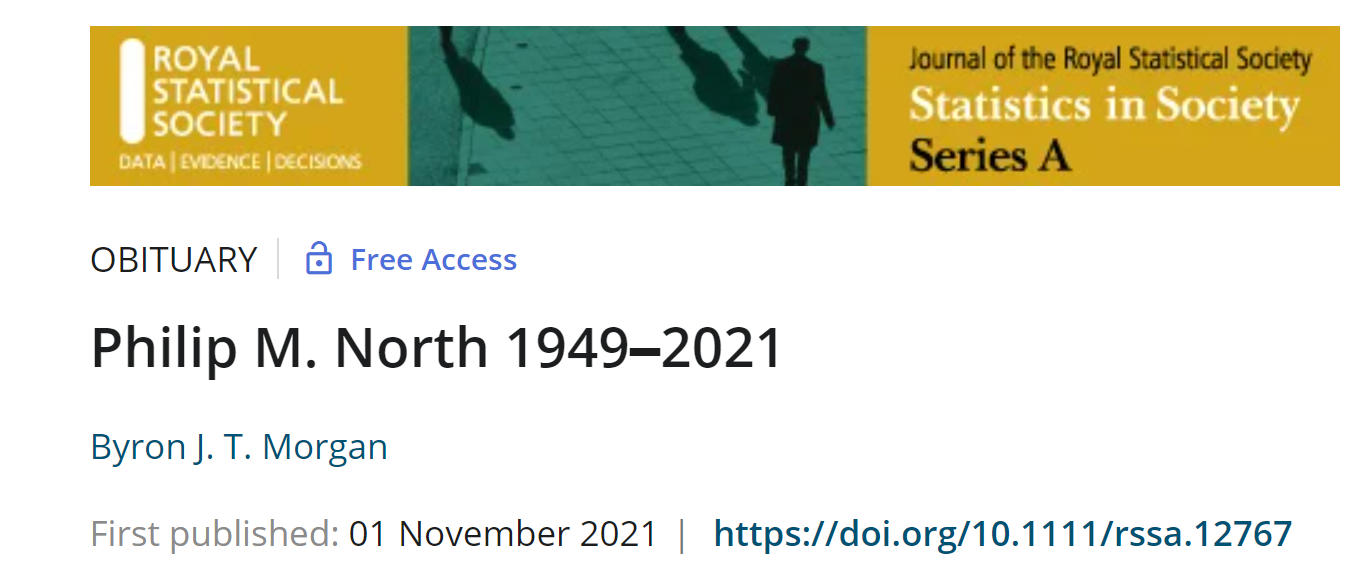Philip North, 21st May, 1949 – 4th June, 2021
It is our sad duty to let you know of the death of Philip North, who died on the 4th June 2021, aged 72. Philip made a huge contribution to the development of the EURING Analytical Meetings, acting as editor of the first five proceedings.
He obtained his PhD on Statistical methods in ornithology from the University of Kent in 1979. This involved the development of novel analyses of various BTO datasets, in particular devising a method of cluster analysis to determine bird territories and enhancing various aspects of survival estimation. His influential 1978 paper in Biometrics used a variety of methods, including logistic regression and point process modelling, to investigate the effects of weather on the survival of grey herons. In addition, through his enthusiasm and research highly productive links were established between the Universities of Kent and St Andrews and with the Centre d’Ecologie Fontionnelle & Evolutive, CNRS Montpellier, which, together with the BTO are continued by the current members of the Statistical Ecology at Kent research group.
Philip was an expert ornithologist and a keen birder. For example, we recall that he was one of a small number of observers who recorded the first sighting of a pallid swift in Britain and Ireland Thus he was well placed to understand both the statistical and ecological aspects of avian ecology. This combination of ornithology and statistical modeling made him an ideal contributor to the EURING Analytical Conferences, as did his role as secretary of the Mathematical Ecology Group of the British Region of the Biometric Society and the British Ecological Society.
Innovative discussions and published proceedings became key features of these EURING meetings. The first two were held in Wageningen in 1986 and at Sempach in 1989 and Philip edited the resulting proceedings single-handed, as well as jointly editing the proceedings of the meetings held in Montpellier (1992), Patuxent (1994) and Norwich (1997; see https://euring.org/meetings/analytical-meetings/analytical-meeting-proceedings ) . This was an important and sustained contribution, which appreciably advanced the theory and application of relevant aspects of statistical ecology, with wide application to both theoretical and applied problems. It also showed how data gathered by the bird ringing/banding schemes coordinated through EURING could be collected and analyzed in ways that enhanced their ecological value. It is particularly noticeable how the content of the conference papers evolved over Philip’s period as editor. The first meeting focused on the use of individual datasets to estimate specific parameters, mainly survival. By the 1997 meeting there was greater interest in model selection and applied studies, with the first signs of the developments in data integration that would follow over the next 20 years.
Philip’s wife Monica died in 2008. They are survived by their children, Robin, Geoffrey and Melissa to whom we extend our deep condolences.
An obituary has recently appeared in JRSSA https://rss.onlinelibrary.wiley.com/doi/10.1111/rssa.12767
Byron Morgan and Stephen Baillie

